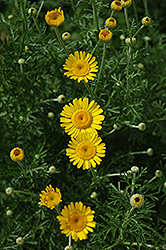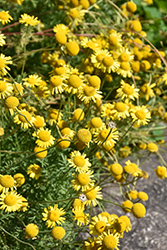It's all about ...
plants

Kelwayi Marguerite Daisy
Anthemis tinctoria 'Kelwayi'
Plant Height: 18 inches
Flower Height: 24 inches
Spread: 18 inches
Sunlight:
![]()
Hardiness Zone: 2a
Other Names: Perennial Golden Marguerite Daisy
Description:
Mounded green, fragrant and ferny foliage features bright sunshine yellow daisies from early summer to early fall; perfect for garden beds or borders; low maintenance plant that is drought tolerant once established
Ornamental Features
Kelwayi Marguerite Daisy has masses of beautiful yellow daisy flowers with gold eyes at the ends of the stems from early summer to early fall, which are most effective when planted in groupings. The flowers are excellent for cutting. Its fragrant ferny leaves remain green in colour throughout the season.
Landscape Attributes
Kelwayi Marguerite Daisy is an herbaceous perennial with a mounded form. It brings an extremely fine and delicate texture to the garden composition and should be used to full effect.
This is a high maintenance plant that will require regular care and upkeep, and is best cleaned up in early spring before it resumes active growth for the season. Deer don't particularly care for this plant and will usually leave it alone in favor of tastier treats. Gardeners should be aware of the following characteristic(s) that may warrant special consideration;
- Self-Seeding
Kelwayi Marguerite Daisy is recommended for the following landscape applications;
- Mass Planting
- General Garden Use
- Naturalizing And Woodland Gardens
Planting & Growing
Kelwayi Marguerite Daisy will grow to be about 18 inches tall at maturity extending to 24 inches tall with the flowers, with a spread of 18 inches. It grows at a medium rate, and under ideal conditions can be expected to live for approximately 5 years. As an herbaceous perennial, this plant will usually die back to the crown each winter, and will regrow from the base each spring. Be careful not to disturb the crown in late winter when it may not be readily seen!
This plant should only be grown in full sunlight. It prefers dry to average moisture levels with very well-drained soil, and will often die in standing water. It is considered to be drought-tolerant, and thus makes an ideal choice for a low-water garden or xeriscape application. It is not particular as to soil type or pH. It is highly tolerant of urban pollution and will even thrive in inner city environments. This is a selection of a native North American species. It can be propagated by division; however, as a cultivated variety, be aware that it may be subject to certain restrictions or prohibitions on propagation.

